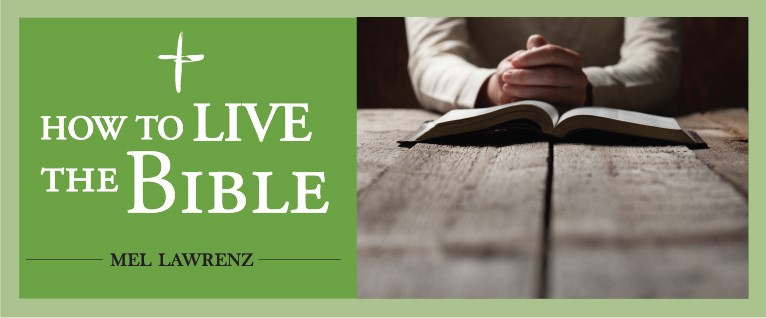
This is the one-hundred-seventy-sixth lesson in author and pastor Mel Lawrenz’ How to Live the Bible series. If you know someone or a group who would like to follow along on this journey through Scripture, they can get more info and sign up to receive these essays via email here.
“If one of your countrymen becomes poor and sells some of his property, his nearest relative is to come and redeem what his countryman has sold…It will be returned in the Year of Jubilee, and he can then go back to his property.” Leviticus 25:25, 28

Consumer debt is at an all time high today. Skillful marketers have developed remarkable ways to convince people that they need all kinds of things, that they deserve them, and that they can have them now. Buy now, pay later. And then, boy do you pay!
This kind of indebtedness can quickly become bondage. Someone else has a claim on you. The rate of interest is a set of chains that holds you. It would be wonderful if someone could come and just break the chains, forgive the debt, and let you start over.
Create your own Bible Gateway free personal account and you’ll immediately upgrade your Bible Gateway experience. Do it right now!
In the dry, unpredictable, and sometimes unfruitful land of Israel, it was very easy for someone not to have enough resources to live on, to go into deep debt, and to lose one’s house or land. And the way people lost their property was frequently illegal, unethical, and unjust.
So God determined that in the Year of Jubilee people would have a second chance. Property long owned by families that had been snatched away would be redeemed. In this buy-back plan (done only once every 50 years, mind you), God simply stipulated that people should be able to return to their ancestral property. If relatives can buy back the land, they should do it. If partial payment can be made, it should happen. One way or another, there should be a return to the way things used to be.
A lot of people would like credit card companies to forgive their debt and let them go. Or they would like to turn back the hands of time and make far different decisions about their indebtedness. So, does the principle of forgiving debt from the Old Testament have any relevance today?
There is a place for the forgiveness of debt, or to be really generous in helping someone out. All of us will have an opportunity some day to help someone out of a jam or to release someone from an obligation to us. We may worry that if we bail someone out, he or she won’t learn from his or her experience. But sometimes the risk is worth it.
APPLICATION
Think of someone who could use your help today. Pray for that person and how you could help them. Maybe they’re having trouble paying rent this month or maybe they’re just getting behind on taking care of their lawn. Think of a way to give someone else a break today!
[See previous – Who Will Make Me Free?]
___________
___________
[If you believe this series will be helpful, this is the perfect time to forward this to a friend, a group, or a congregation, and tell them they too may sign up for the weekly emails here]
Mel Lawrenz (@MelLawrenz) trains an international network of Christian leaders, ministry pioneers, and thought-leaders. He served as senior pastor of Elmbrook Church in Brookfield, Wisconsin, for ten years and now serves as Elmbrook’s teaching pastor. He has a PhD in the history of Christian thought and is on the adjunct faculty of Trinity International University. Mel’s many books include Spiritual Leadership Today: Having Deep Influence in Every Walk of Life (Zondervan, 2016). See more of Mel’s writing at WordWay.
The post How to Live the Bible — Forgiving Debt appeared first on Bible Gateway Blog.












